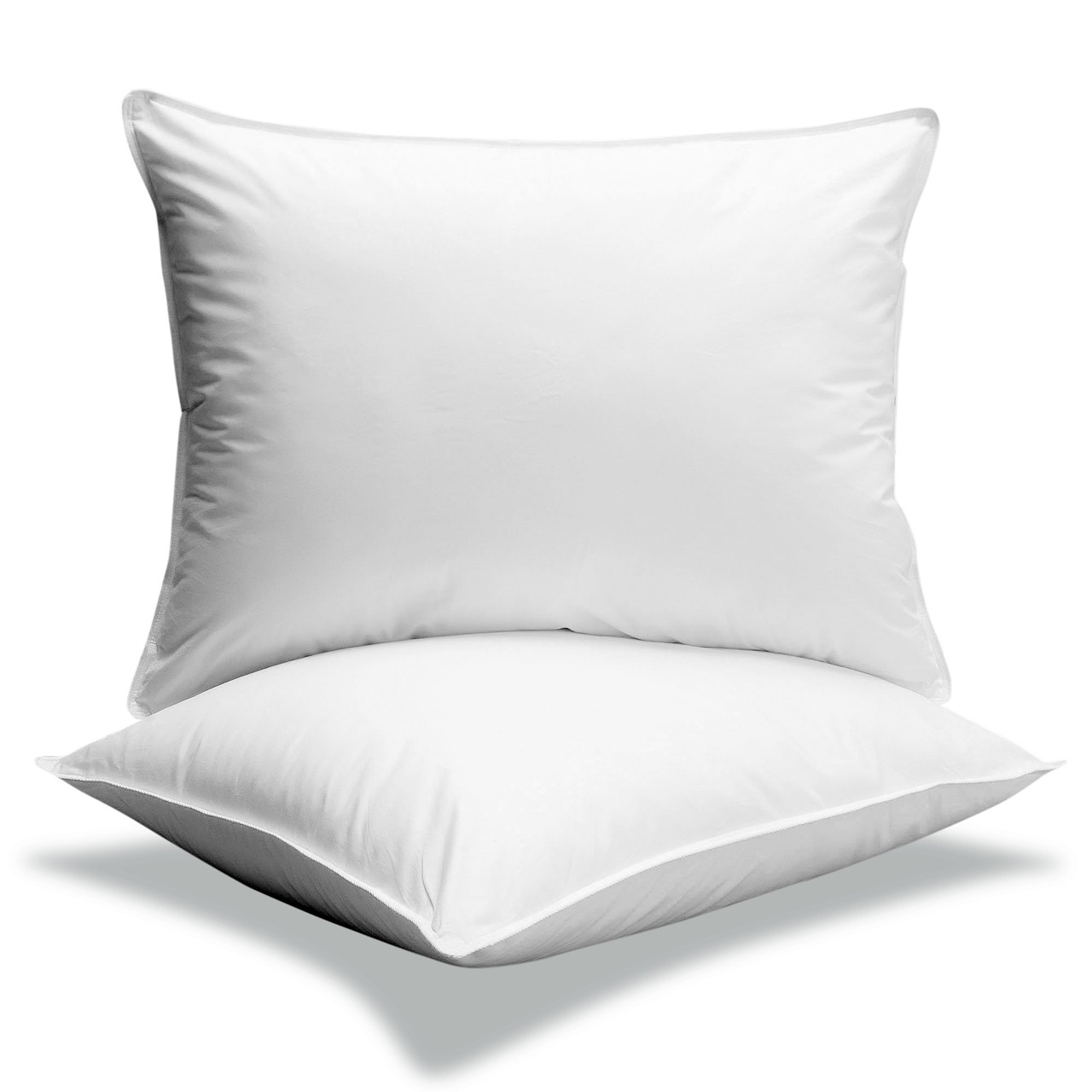Is My Pillow Causing Neck and Shoulder Pain? Here’s What You Need to Know!
If you’ve been waking up with nagging neck and shoulder pain, you might want to take a closer look at your pillow. You might wonder Is my pillow causing neck and shoulder pain? The right pillow can make a significant difference in your comfort and overall sleep quality, while the wrong one can lead to increased pain and discomfort.

Many people do not realize that their pillow could be the culprit behind their aches. Pillows come in a variety of shapes, materials, and firmness levels, and each type can affect your neck and shoulder alignment during sleep. Choosing a pillow that supports your specific sleeping position is crucial for preventing pain.
If you suspect your pillow is causing issues, there’s good news. Making some changes to your pillow choice can lead to better sleep and less discomfort. Understanding how a pillow impacts your sleep can empower you to make adjustments that promote a healthier, pain-free lifestyle.
Key Takeaways
- The correct pillow supports neck and shoulder alignment.
- Different pillow types impact sleep quality significantly.
- Adjusting your pillow can help alleviate pain.
Understanding Neck and Shoulder Pain

Neck and shoulder pain can often stem from your sleep habits and pillow choice. You might not realize how much your sleep posture and the pillow you use affect muscle tension and discomfort.
The Role of Sleep Posture in Muscle Tension
Your sleep posture plays a big role in how your neck and shoulders feel when you wake up. If you sleep on your back, use a rounded pillow that supports the natural curve of your neck. This prevents strain and keeps your spine aligned.
If you’re a side sleeper, choose a thicker pillow to keep your neck in line with your spine. A pillow that’s too flat can cause discomfort or even lead to muscle tension. For stomach sleepers, it’s best to avoid using a pillow or opt for a very thin one to reduce neck strain. Poor sleep posture can lead to issues like muscle tightness and pain.
How Pillow Choice Affects Neck Pain and Discomfort
The pillow you choose directly impacts your neck health. A pillow that is too high or too low can create strain, leading to discomfort. Look for pillows that maintain your head and neck alignment.
There are different types of pillows to consider, like memory foam or cervical pillows. These provide better support by conforming to the shape of your neck. If you’re experiencing neck pain, evaluate your pillow choice. It might be time for an upgrade.
Identifying Signs of Poor Pillow Support
You may notice a few signs if your pillow isn’t supporting you well. Common indicators include waking up with stiffness, pain, or soreness in your neck and shoulders.
Other symptoms might include headaches or a feeling of tension in your muscles. If you often adjust your pillow during the night to find comfort, it may not be suitable for you. Pay attention to how your body feels each morning. Adjusting your pillow choice could greatly improve your sleep quality and reduce discomfort.
Types of Pillows and Their Impact on Sleep

Choosing the right pillow can make a big difference in your sleep quality and overall comfort. Different types of pillows offer various levels of support, which can affect your neck and shoulder pain directly. Here’s a closer look at some popular pillow types.
Feather vs Memory Foam: A Comparison
Feather pillows are known for their softness and moldable nature. They let you adjust the pillow’s shape to fit your head and neck. This can be great for some, but if you need firm support, a feather pillow might not cut it.
On the other hand, memory foam pillows provide more support. They contour to your head and neck, promoting better spinal alignment. This can help reduce neck and shoulder pain. If you’re someone who tosses and turns at night, consider trying a memory foam pillow for a more comfortable experience.
Latex Pillows and Spinal Alignment
Latex pillows are often overlooked but can be excellent for spinal alignment. They are firmer than feather pillows but still offer some give. The resilience of latex helps keep your head and neck supported without sinking too much. This can prevent strain on your neck and shoulders.
Also, latex pillows tend to have good airflow, which keeps you cool throughout the night. If you sleep hot, this could be a game changer. Their durability means you get long-lasting support without sagging, which can be a common issue with other pillow types.
Orthopedic and Contour Pillows for Targeted Support
If you deal with consistent neck or shoulder pain, orthopedic or contour pillows may be what you need. These pillows are designed to support your neck’s natural curve and improve alignment while you sleep. They’re often firmer and come in various shapes to fit your needs.
Contour pillows can be especially helpful if you sleep on your back or side. They provide targeted support where you need it most, reducing pressure on your joints. An orthopedic pillow can give your neck the support it needs, which may lead to a more restful night and less morning stiffness.
Best Sleeping Practices for Pain Prevention
Good sleep practices can make a big difference in preventing neck and shoulder pain. Focusing on your sleeping position, mattress firmness, and maintaining proper neck curvature will help you sleep better and wake up pain-free.
Ideal Sleep Positions for Neck and Shoulder Health
Your sleeping position plays a key role in neck and shoulder health. If you’re a side sleeper, use a pillow that keeps your head aligned with your spine. This helps to support the natural curve of your neck. A firmer pillow is often better for side sleepers.
Back sleepers should aim for a thinner pillow that doesn’t push your head too far forward. Look for one that fills the gap between your neck and the mattress. This way, your neck stays in a neutral position.
Stomach sleepers generally should try to change positions, as it can strain the neck. If you must sleep on your stomach, a very thin pillow or no pillow at all might help reduce strain.
The Importance of Mattress Firmness and Compatibility
The firmness of your mattress also impacts your sleep and neck health. A mattress that is too soft can cause your body to sink, putting pressure on your neck. For most people, a medium-firm mattress supports the body well while keeping the spine aligned.
When looking for a mattress, consider your sleeping position. Side sleepers may benefit from a softer mattress that allows shoulders and hips to sink in, while back sleepers often find medium-firm mattresses more comfortable. Stomach sleepers usually need a firmer option to prevent excessive arching of the back.
Testing out different types of mattresses can help you find what works best for you.
Strategies for Maintaining Neck Curvature During Sleep
Maintaining the natural curvature of your neck is essential for avoiding pain. Use pillows that provide adequate support. For instance, a contour pillow designed for neck support can help keep your neck aligned.
You might also try placing a pillow between your knees if you’re a side sleeper. This helps keep your hips aligned, reducing strain on your back and neck.
Adjusting your current sleep environment can also help. Make sure your pillow is the right height and firmness. Changing pillows every few years is a good idea as they lose support over time.
By focusing on these practices, you can promote better sleep and reduce the chances of waking up with neck and shoulder pain.
Additional Factors Contributing to Neck and Shoulder Pain
Several issues beyond your pillow might be causing neck and shoulder pain. Understanding these factors can help you pinpoint what’s contributing to your discomfort.
The Connection Between Arthritis and Sleep Discomfort
If you have arthritis, especially osteoarthritis, you might notice more stiffness and nagging pain at night. Arthritis can make your joints inflamed, which can lead to pressure points forming while you sleep.
These pressure points can disturb your rest, causing you to toss and turn. This movement can further strain your neck and shoulders.
To minimize discomfort, try adjusting your sleep position. Keeping your neck aligned with your spine can help ease the pressure caused by arthritis. Also, using a supportive pillow designed for those with arthritis can provide more comfort.
How Daily Habits and Posture Can Lead to Nighttime Pain
Your daily habits play a big role in how well you sleep and feel at night. If you often find yourself slouching or leaning over your devices, this poor posture can tighten your neck and shoulder muscles.
Even sudden movements during the day can lead to soreness that follows you to bed. When you sleep in a position that doesn’t support your neck or if you wake up with stiffness, it may be linked to how you held yourself during the day.
To help prevent this, pay attention to your posture throughout the day. Make small changes, like taking breaks to stretch, to keep your muscles relaxed. These adjustments can make a big difference in how you feel at night.
How to Choose the Right Pillow
Choosing the right pillow is key to avoiding neck and shoulder pain. It involves considering the firmness, materials, and your unique sleeping habits. Let’s break down what you need to know to make a smart choice.
Evaluating Pillow Firmness and Material
The firmness of your pillow can greatly affect your comfort. Soft pillows often work best for stomach sleepers, while firm pillows provide more support for back and side sleepers.
When picking a material, consider:
- Memory foam pillows: These contour to your head and neck, offering good support.
- Feather pillows: They are soft and adjustable but might not provide enough support.
- Latex pillows: These are firm and long-lasting, giving great support and comfort.
Look for pillows with adjustable fill, too. This lets you customize the height and firmness as needed.
Pillow Recommendations for Different Types of Sleepers
Your sleeping position is crucial in selecting the right pillow. Here’s a quick guide:
- Side sleepers: You need a taller and firmer pillow to fill the gap between your head and the mattress. Consider latex pillows or mixed fillers for extra support.
- Back sleepers: Opt for a medium-firm pillow. It should support the natural curve of your neck. Memory foam can be a good choice here, giving you both comfort and support.
- Stomach sleepers: Choose a softer and thinner pillow to prevent neck strain. Feather pillows can be a good option as they compress easily.
When to Consult a Chiropractor or Specialist
If you regularly wake up with neck or shoulder pain, it might be time to consult a chiropractor or other specialist. They can assess your posture and sleeping habits.
A professional can help identify if your pillow is the issue or if other factors are contributing to your pain. They might suggest specific adjustments to your sleep routine or recommend certain types of pillows tailored to your needs. Don’t hesitate to ask for help if pain persists, as proper guidance is essential for long-term comfort.
Lifestyle Adjustments to Alleviate Neck and Shoulder Pain
Making simple lifestyle changes can help reduce neck and shoulder pain. Focus on exercises, stretches, and ergonomics to support your neck muscles and improve comfort throughout your day.
Exercises and Stretches for Neck Muscle Relief
Incorporating specific exercises can ease muscle tension and stiffness in your neck. Simple stretches like the neck tilt can help. Gently tilt your head to one side and hold for 15-30 seconds before switching sides.
Repetitions: Aim for 3-5 times on each side.
Another effective stretch is the chin tuck. Push your chin towards your chest while keeping your shoulders relaxed. This helps in achieving proper alignment, which can prevent morning neck pain.
Perform these exercises daily to strengthen neck muscles and improve comfort.
Ergonomic Advice for Reducing Daytime Strain
Pay attention to your workspace to reduce neck and shoulder strain. Ensure your computer screen is at eye level to maintain proper alignment. Your chair should support your lower back and keep your feet flat on the ground.
Using a headset for phone calls can also greatly reduce muscle tension. Hold your phone between your shoulder and ear for extended periods can strain your neck.
Remember to take breaks. Stand up, stretch, and move around every hour. Prioritizing these adjustments can lead to less soreness and stiffness in your neck area.
Conclusion
If you’re waking up with neck and shoulder pain, your pillow might be the culprit. It’s important to understand how your pillow supports your head and neck while you sleep.
Here are a few key points to think about:
- Support: Your pillow should keep your neck aligned with your spine. If it’s too high or flat, it can cause strain.
- Material Matters: Some materials like memory foam can provide better support than traditional pillows. Consider trying different types to see what works best for you.
- Replacement: If your pillow is old or damaged, it may be time to replace it. A worn-out pillow can lead to missed support.
If you notice consistent pain, it might help to adjust your pillow or look into alternatives. Finding the right pillow can lead to better sleep, making morning pain a thing of the past.
Take the time to experiment with your options. Your neck will thank you!
Frequently Asked Questions
If you’re wondering whether your pillow could be the reason for your neck and shoulder pain, you’re not alone. Many people have similar doubts and concerns about how their sleep setup affects their comfort.
How can I tell if my pillow is to blame for my neck pain?
Pay attention to how you feel when you wake up. If your neck pain is worst in the morning and improves throughout the day, it might be a sign that your pillow isn’t supporting you properly.
What kind of pillow should I use to avoid neck and shoulder pain?
Look for a pillow that keeps your head and neck aligned with your spine. Memory foam and latex pillows are often recommended because they offer good support. Avoid feather pillows that may not provide enough structure.
Can sleeping on my side cause shoulder and neck pain?
Yes, sleeping on your side can sometimes lead to discomfort if your pillow isn’t the right height. If it’s too high or too low, it can strain your neck and shoulders.
What’s the best way to sleep if I’m trying to ease neck and shoulder discomfort?
Sleeping on your back is generally the best position for neck and shoulder pain relief. Use a supportive pillow that conforms to your neck’s curve. A slight elevation can also help keep your spine aligned.
I woke up with neck pain and can’t turn my head, what should I do?
If you experience severe pain and difficulty moving your head, it’s a good idea to consult a healthcare professional. They can help determine the cause and suggest appropriate treatment.
Are there specific pillows I should consider if I keep getting headaches and neck pain?
You might want to consider a cervical pillow or a contoured memory foam pillow. These options can help maintain proper alignment, which may reduce headache frequency linked to neck issues.

